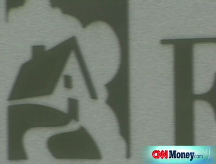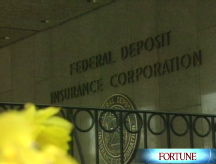$1 trillion in losses? Bank on more
Wall Street should not be surprised to see pain in the financial sector linger on for much longer.

NEW YORK (CNNMoney.com) -- Make no mistake: The worst probably is not over for financial firms. Not by a long shot.
Many bank stocks have bounced sharply from their panic-induced lows of mid-July on hopes that the bleak second-quarter results represented the bottom.
But the bigger-than-expected losses reported by Freddie Mac (FRE, Fortune 500) and Fannie Mae (FNM, Fortune 500) this week, accompanied by dismal forecasts for the housing market, are strong indicators that there are likely more credit-related woes to come.
"The banks are still at the mercy of writedowns. I don't think the worst is over for financials yet," said Liz Ann Sonders, chief investment strategist with Charles Schwab & Co.
The International Monetary Fund forecasts that global losses tied to the credit crisis will be $945 billion. It's a widely used number, but Sonders thinks it's "potentially very conservative."
So how high could losses go? Sonders points to the $1.6 trillion forecast from hedge fund firm Bridgewater Associates or even the $2 trillion number from Nouriel Roubini, the highly-respected professor of economics at NYU's Stern School of Business.
And based on the losses already reported, we're not even halfway through the crisis.
But as scary as those predictions sound, it's actually somewhat healthy to see forecasts of bigger losses. Sonders said that at some point, the market will probably even begin to discount the fact that there are more losses ahead. They key is that investors have to expect them in the first place.
The biggest problem that the market has had to grapple with this year is that investors can't believe the numbers that banks are reporting.
We've been fooled a couple of times into thinking that banks finally had gotten the bulk of their most toxic loans off their balance sheets.
So instead of this death by a thousand cuts, we might just need a big bloodletting in the banking system.
As bad as this financial crisis seems right now, only eight banks have failed so far this year. That pales in comparison to the 534 that collapsed in 1989 - the height of the savings and loan debacle.
With that in mind, some think the Federal Reserve is perpetuating the problem in banking by keeping interest rates as low as they are. The Fed held its key benchmark fed funds rate at 2% following its meeting earlier this week.
John Lekas, founder and CEO of Leader Capital Management and portfolio manager of the Leader Short-Term Bond Fund, thinks the Fed should start raising interest rates before the end of the year.
Lekas argues that rate hikes would help to strengthen the dollar and reduce inflation pressures. He said it might also encourage more saving by consumers since rates on money-market accounts are closely tied to the fed funds rate.
And a stronger dollar, reduced inflation and increased savings would be a positive for the economy, even if the consequence was more short-term pain for banks.
"The Fed's current policy is to bail out the weak hands in banking and punish the savers in this country," said Lekas. "But this is a Band-Aid policy that is not addressing the real problem of inflation. The Fed should be trying to save the whole system, not save the overextended and irresponsible."
Nonetheless, as I've argued for some time in this column, the markets and economy don't need the financial sector to be at 100% health in order to hold up. There are plenty of other industries that have been doing well despite all the economic headwinds.
It was encouraging to see that stocks actually rallied early Friday morning despite the bad news from Fannie Mae. The continued decline in oil prices and a resurgent dollar are helping to minimize the pain in the financial sector.
Still, until more banks come truly clean about how much worse their losses will get and until the Fed stops trying to save banks that should be allowed to fail in a free market, expect the financial sector to keep bleeding red ink.
Vacation, all I ever wanted And on that cheery note, it's time for the Buzz to take a little break. I'll be back on Tuesday, Aug. 19. Enjoy those remaining lazy, hazy days of summer!
Issue #1 - America's Money: All this week at noon ET, CNN explains how the weakening economy affects you. Full coverage. ![]()




